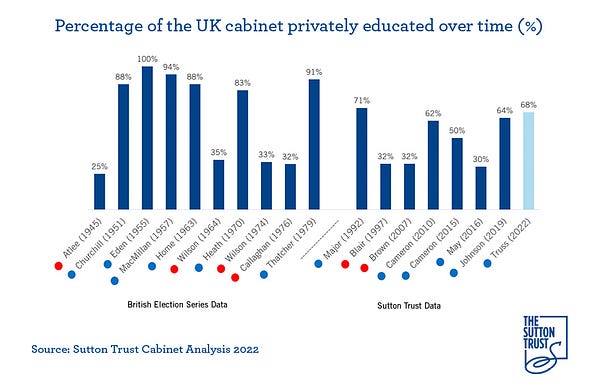There’s often talk about the effects of private education on politics, such as this:-


On the surface, sending your children to private school gives you a better chance of getting into the cabinet. But what if that’s not the cause?
Here’s something to ponder: if private education has such a huge effect, how come they don’t have more of the cabinet? There are millions of privately educated people out there, but they can’t beat 10 state educated kids?
So, let’s float this out here: people in the cabinet are mostly people who had supportive, well-off parents, and this correlates with private education. Liz Truss has two parents who were a professor of mathematics, and a teacher. That’s the sort of combined earnings where you can afford to put your children through private school. But they chose not to.
And I think that this external support factor is important to the success of politicians, whether the support is from parents, husband or wife. The early years of politics have lean earnings. Politicians have to put in a lot of time trying to further their career. Whether making speeches, fighting unwinnable seats, working in party research. And this pays little. It shuts out many of the poorest in society. The Labour Party is different, but the support there comes more from trade unions or the co-operative.
Because if private education was such a huge advantage, we’d expect to have something measurable showing that. We know how much benefit private education yields. The Sutton Trust have researched this.
The study’s findings align with the conclusions of research conducted by the Social Market Foundation for the Sutton Trust, which found that a privately educated person will have earned a cumulative total of £193,700 more than a state-educated worker by the time they are 42, on average. Even allowing for family background and prior educational attainment, the total premium is still nearly £58,000.
So, 24 years after they leave school, they earn £58,000. Which is something like £2400/year. Which could be explained by how private schools have entrance exams to keep the dumbest kids out, or how they give scholarships to genius kids. Or the geography of private school kids.
But even if it’s not, that’s not making a big difference. It’s not giving people much of an edge over state schools. Not enough to dramatically change the sort of people who get into the cabinet.
And when you consider that the cost of private education is over £100K, you’d probably have done better spending the money on a deposit for your children’s house.


